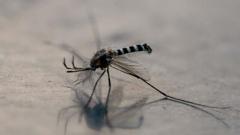Colombia is facing a significant health crisis as a yellow fever outbreak claims at least 34 lives, prompting officials to declare a nationwide health emergency.
Colombia Faces Health Crisis: Nationwide Emergency Declared Due to Yellow Fever Outbreak

Colombia Faces Health Crisis: Nationwide Emergency Declared Due to Yellow Fever Outbreak
Amid rising fatalities, Colombian authorities take measures to combat yellow fever spread with a vaccination push.
In recent developments, the Colombian government has announced a nationwide health emergency response following the alarming death toll due to yellow fever. The outbreak has resulted in at least 34 fatalities, with health officials recording 74 confirmed cases so far. Yellow fever, a viral infection transmitted by mosquitoes, poses a serious health risk, particularly during the Easter holiday when many Colombians travel to regions where the virus is more prevalent.
To combat the outbreak, Health Minister Guillermo Alfonso Jaramillo has emphasized the importance of vaccinations, urging citizens to get vaccinated, especially those traveling to high-risk areas in eastern Tolima province. The province, known for its picturesque coffee plantations, is experiencing a surge in cases, drawing both national and international tourists.
In an effort to mitigate the spread of the virus, the government will now require travelers heading to high-risk areas to provide proof of vaccination. President Gustavo Petro took to social media, advising unvaccinated individuals against visiting affected regions during the upcoming Easter weekend.
The nature of yellow fever makes it difficult to diagnose, as its symptoms can imitate other diseases. The World Health Organization (WHO) highlights that while many recover from the initial phase, approximately 15% may progress to a severe form of the disease, characterized by high fever and other serious complications. The mortality rate for those entering this more critical phase is alarmingly high—estimated at around 50%. To combat this public health emergency, the Colombian government continues to promote free vaccination to safeguard the population.
To combat the outbreak, Health Minister Guillermo Alfonso Jaramillo has emphasized the importance of vaccinations, urging citizens to get vaccinated, especially those traveling to high-risk areas in eastern Tolima province. The province, known for its picturesque coffee plantations, is experiencing a surge in cases, drawing both national and international tourists.
In an effort to mitigate the spread of the virus, the government will now require travelers heading to high-risk areas to provide proof of vaccination. President Gustavo Petro took to social media, advising unvaccinated individuals against visiting affected regions during the upcoming Easter weekend.
The nature of yellow fever makes it difficult to diagnose, as its symptoms can imitate other diseases. The World Health Organization (WHO) highlights that while many recover from the initial phase, approximately 15% may progress to a severe form of the disease, characterized by high fever and other serious complications. The mortality rate for those entering this more critical phase is alarmingly high—estimated at around 50%. To combat this public health emergency, the Colombian government continues to promote free vaccination to safeguard the population.


















